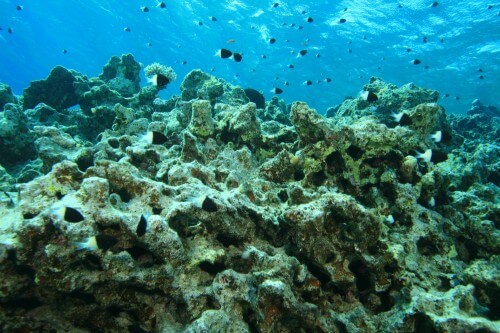The study conducted by researchers from the USA, Tel Aviv University and Ben Gurion University, reveals the toxic effect of a chemical called benzophenone-2 found in many cosmetic products such as soaps, washing liquids and perfumes * Alarming findings were also discovered in the Gulf of Eilat * The study will be published next week in the journal The prestigious Ecotoxicology

A team of researchers from the USA and Israel found that a chemical called Benzophenone-2 has a toxic effect on coral reefs. It is the most common chemical in widely used cosmetic products. The researchers have so far listed over 2 toiletry and cosmetic products that contain the dangerous chemical, including soaps, washing liquids and powders, perfumes and creams.
The research, which will be published on Sunday, January 19.1.14, XNUMX in the journal Ecotoxicology, is signed by: Dr. Craig Duanes from the American Haereticus Environmental Laboratory Institute, Prof. Yossi Loya, Dr. Esti Winter, the research student, Roi Segal and doctoral student Amri Bronstein from Tel Aviv University , Prof. John Fauth from the University of Central Florida, Dr. Ariel Kushmaro, Yona Lichtenfeld and Rina Yager from Ben-Gurion University, Dr. Cheryl Woodley and Dr. Paul Pennington from the US NOAA.
The study shows that when the chemical benzophenone-2 penetrates the marine environment it acts quickly and is considered particularly lethal to young corals, even at extremely low concentrations of single molecules (concentrations measured in units of one per billion). Moreover, it was found that the chemical also damages mature corals, causing a phenomenon known as "coral bleaching" and damage to the corals' DNA.
"This is the first of a series of articles that will be published on the topic of the toxic effect of various chemicals on the marine environment in general, and on coral life in particular," explains Amri Bronstein from the Department of Zoology in the Faculty of Life Sciences of Tel Aviv University. "The current article refers to a series of tests we conducted on the effect of benzaphonone-2 on corals, and especially on the early stage of the corals' life, when they are still mobile in the water as juveniles (the stage in which they still have the ability to swim). We found the highest concentrations of benzophenone-2 in the Caribbean, but we also conducted measurements in the Gulf of Eilat, in collaboration with the Inter-University Institute in Eilat, and the results were similar - and no less alarming."
The cosmetics industry will be forced to respond
The chemical benzophenone-2 has been widely used in the cosmetics industry since the sixties of the last century. At the same time, the increase in the human population and human activity near the coastal areas leads to an increased production of sewage in those areas and significantly increases the pollution caused by the use of the chemical. The increasing contamination of the marine environment with benzophenone-2 poses a real risk to the conservation and restoration efforts of coral reefs around the world and may be one of the main factors thwarting these efforts. It should be noted that benzophenone-2 is a chemical that cannot be filtered in most of the wastewater treatment facilities that exist today.
"The cosmetics industry will have to respond to our research," says Bronstein. "In the US, pressure has already begun on our colleagues in order to prevent the publication of the study, but after publication they will have no choice but to refer to it and align themselves according to it. I believe the day is not far when we will start seeing the 'BP2 Free' label on cosmetic products. At the end of the day, our goal is to save the reefs from destruction."
The American Marine Policy Committee cites three major factors for human damage to coral reefs in recent years: pollution, an increase in seawater temperature and overexploitation of marine resources. In the Caribbean, where most of the tests in the current study were conducted, over 80% of the coral reefs have disappeared since the early XNUMXs. Large parts of those reefs that disappeared were those near the coasts.

2 תגובות
Would it be possible to get the response from the Ministry of Environmental Protection, or the Nature Authority? In general, it would be interesting to know Minister Peretz's position in the areas of environmental protection, global warming, biological diversity, and more.
I work for a company that produces cosmetic creams, among other things. I've never heard of this stuff. Does he have other names?